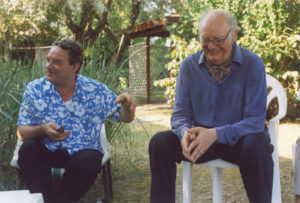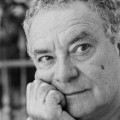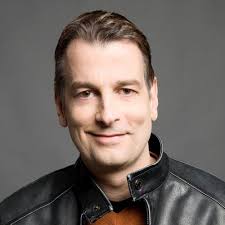
Something we have known in Italy from the origins of theatre is that the actor who becomes an author invents his own style of language, experiments with new ones, or restores older or neglected styles. Now the actor’s body takes its turn, filtered through the experiences of the French mime, the environment, set mechanics, and dramaturgy taken from the dismantling of the classics. The theatre style of both you and Franca has a strong civil and politic impact, particularly in the execution of monologues, and it illustrates a strong nexus to the traditions of the actor’s theatre. What is the intimate relationship between you and the actor’s craft?
There is the depiction of an actor waiting his turn to enter the stage, painted on a vase with light colored figures and crafted according to IV century BC Corinthian style. He is wearing a sumptuous costume with finely detailed lace and is holding a severed head by the hair, which is actually a round shaped mask with a wig attached to it. One would have to be theatrically abstinent if he or she fails to understand that the character is a headhunter. In fact, the actor holds that dangling head/mask with such aloofness, with such detachment and lack of tragic nature that one cannot fall into error: that which he is holding in his hand (the mask with the attached wig) is a tool of the trade. I must stress that he is a tragic actor without tragic nature! I am talking about an emotional and passionate tragic nature, and someone devoid of this is the true actor: he or she whose profession is acting. This does not mean the actor is bereft of emotions. Quite the contrary. The actor who clearly knows his role – who has weighed within himself the rapport between gestures, voice, and timing – is able to spur his inner emotions to enrich the character, the representation of feelings, rhythmic accelerations and acting alternatives, thereby adding new layers to the dramatic or comic story being told.
Nowadays, almost everyone puts emphasis on the actor’s body and the dramatic text. What are your thoughts on that?
Oh, we can say that the actor is the ultimate linchpin of support for the entire performance. One could yell out, “Enough with theatre overwhelmed by direction and with actors used at half their capacity!” In saying this, our intention is certainly not to point out those actors who rationally envelop themselves in their roles, actors who self-direct, who see themselves projected onto the scenic space in an architectural dialogue with the other players, lights and various scenic elements. No. The actors we are highlighting here, rather, are histrionic: those who spout out rivers of charisma and thrills – the great “entertainers”, if you will. I know that many see me and Franca as part of that bunch of performers considered showmen. This, however, is a great misrepresentation. Considering both of us leave ample room for improvisation, we entrust our acting method to inspiration, causality, and thus, to the “state of grace” that supports us on one night and abandons us on another. No, there is nothing more false than to consider us part of that bunch. Our improvisational technique is tied to a scientific method. It is tied to a strong craft with a very precise sequence of rules and canons. Hence, that which we produce is usually consistent. It increases or diminishes based only on our preparation and on the energy the audience gives to or takes from us. In the end, however, it is always we who direct the dance.
Yet, your notoriety, just the presence of you and Franca on stage, decisively affects your rapport with the audience before they even enter the theatre.
Well, I have to stress the fact that the problem is not just the actor’s appeal, even if his or her presence on stage is certainly of importance, but it is rather about the theatre actor’s entire store of resources. There are highly successful and prestigious actors who, after acting the same play over time, lose the dramatic dimensions of the character. The performance becomes routine and the lines spoken are singsongy and flat – all this without the actor’s knowledge. The actor begins to “sing” the lines and perform with what can be defined in theatre as an “affectation”.
Why is this? Is it due repetition?
No. The inevitable “technicalization” of the performance and the resulting “affectation” are due to the decay of dramatic tension, or to a “break down” in the directing. In short, it is not enough to be in control of oneself and rational, one must also have the strength to know enough to re-examine and change one’s own expressive means, that is, there is a need to listen to and reevaluate oneself each time.
Does the company you two have employ certain techniques or methods?
We at the Comune Theatre Company have the good habit of videotaping each show after a few months of performance. Then, together we watch the recording several times. We observe and make changes to the performance. This is one method. I believe, however, that the most direct way of doing things is to listen to the people, the audience, and by both discussing with and talking to individuals we esteem, even to the extent of provoking them as to elicit their honest opinions and allow them to point out elements regarding the end product of your work. The actor’s craft is the work of an artisan. The greater your foundations of knowledge and functionality are, that on which you base your skills and attributes, the greater your artistic output will be. One must not have any biases at all in the way he or she represents characters or stories. One cannot worry about being new at any cost, about being modern and not following the trends of the moment. These are games played by “gangs of snobs”, and one will always pay dearly for engaging in such games. It is important to do serious theatre, and perform it earnestly, even with some fun added in. If they then say you are not expressing anything new, that perhaps you are repeating yourself all over again, be patient…the time for a revival will come.
Cesenatico, Italy, August 1983
First publication of this interview in English translation.

Waler Valeri holds an MFA in dramaturgy from MAXT/ART at Harvard University. In 1973, he founded Sul Porto magazine in Cesenatico, which dealt with cultural affairs in the province. He was Dario Fo and Franca Rame’s personal assistant from 1980 to 1995. In 1981, he won the International Mondello Literary Award for Canzone dell’amante infelice (Guanda). In 1985, he founded and managed the indie magazine, Il Taccuino di Cary in London. In 1990, he published Ora settimana (Corpo 10) with a foreword by Maurizio Cucchi. Walter Valeri’s books include Franca Rame: A Woman on Stage (Perdue University Press, 1999), An Actor’s Theatre (Southern Illinois University Press, 2000), Donna de Paradiso (Editoria e Spettacolo, 2006), and Dario Fo’s Theatre: The Role of Humor in Learning Italian Language and Culture (Yale University Press, 2008). From 2000 to 2007, he founded and directed The Cantiere International Youth Theatre, a project established in collaboration with the City of Forlì and The University of Bologna. In 2005, he published the poetry anthology Deliri Fragili (BESA). He has translated various works of poetry, prose, and theatre into Italian such as, A German Requiem by James Fenton, Carlino by Stuart Hood, Adramelech by Valére Novarina, The Blind by Maurice Maeterlinck, Knepp and Krinski, both by Jorge Goldenberg, and Nobody Dies on Friday by Robert Brustein. In 2006, he founded the international poetry festival Il Porto dei Poeti. His latest works include Visioni in Punto di Morte (Nuovi Argomenti, 54, 2011), Another Ocean (Sparrow Press, 2012), Ora settimana – second edition (Il Ponte Vecchio Press, 2014), Biting the Sun (Boston Haiku Society, 2014), Haiku: My name-Il mio nome (Qudu Publishing, 2015), Parodie del Buio (Il Ponte Vecchio, 2017), and Arlecchino e il Profumo dei Soldi (Il Ponte Vecchio, 2018). He writes for Teatri delle Diversità and Sipario magazines as well as for the online literary journal lamacchinasognante.com. He is also team member of The Poets’ Theatre of Cambridge, Massachusetts.

About the translator:
Marco Remo Zanelli holds a B.A. from Emerson College and an M.A. from Middlebury College. He is both a translator and Italian instructor, as well as an actor and director. He has translated theatrical, academic, literary, journalistic, and historical texts into English, in addition to television subtitles. He has collaborated with people and entities such as American Scientific Frontiers (PBS), historians Nicola Labanca and Angelo Del Boca, Equilibri, filmmaker Marcellino De Baggis, Paoletti Softdrinks, The Forum for the Problems of Peace and War and The Ivory Press, among others. As an actor and/or director, he has worked on Twelfth Night, Romeo and Juliet, The Tempest, A Midsummer’s Night Dream, All’s Well That Ends Well, The Three Sisters, on film productions and with various CBS, ABC, and NBC affiliates in addition to the NBC national TV network. He has also worked as a television promotion writer, producer and editor.






















































Comments 1